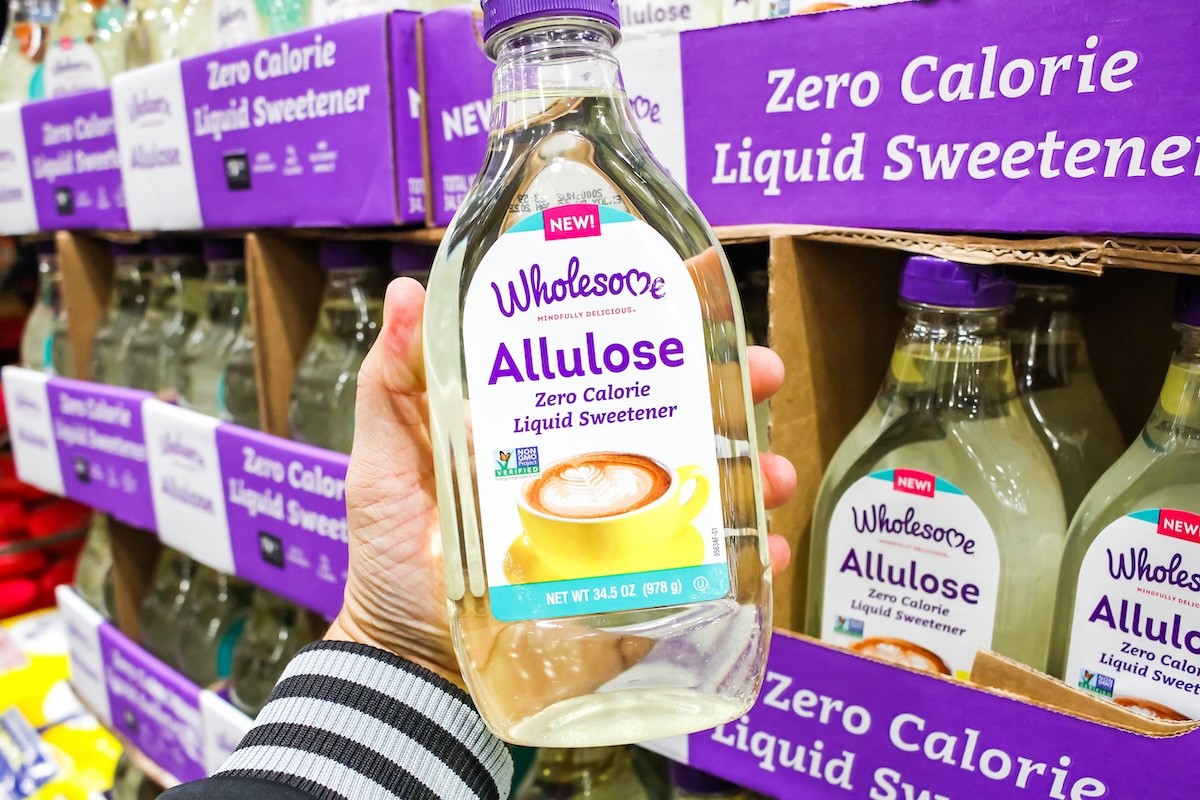A New Sugar Substitute is Hitting Shelves—Is It Safe?

Consuming too much added sugar can wreak havoc on your health, contributing to a range of serious chronic conditions like obesity, Type 2 diabetes, and heart disease. However, recent research has also called into question whether sugar substitutes are much better for you.
Though studies have largely debunked the assertion that sugar alternatives cause cancer, Mayo Clinic points out that there are still some causes for concern: “Some research on long-term, daily use of artificial sweeteners suggests a link to a higher risk of stroke, heart disease and death overall. But other things people do, or healthy habits that people don’t do, may be the cause of the higher risk.”
Now, a new sugar substitute known as allulose is hitting shelves and gaining popularity. Many people have taken to the product, touting its low calorie levels and cane-sugar flavor. But is allulose as safe as it sounds?
RELATED: Low-Calorie Sweeteners Can Hurt Your Heart, New Research Shows—Here’s What to Use Instead.
What is allulose?

According to Cleveland Clinic, allulose is a naturally occurring sugar that can be found in figs, wheat, raisins, maple syrup, and molasses.
Unlike natural cane sugar, the sugar alternative does not contribute to tooth decay or affect blood sugar levels.
Additionally, a November, 2024 study on the effects of allulose on gut health found that test and control groups had “no significant differences in microbial diversity, pathogenic bacteria levels, or short-chain fatty acid production, suggesting that D-allulose consumption is safe and does not adversely affect the gut microbiome or pathogen presence.”
Allulose is available at grocery stores as a sugar product or a liquid sweetener.
Is allulose a safe sugar substitute?
When allulose is used as a sugar substitute, “you’re getting much more of it than is natural,” the Clinic notes. Because of this, allulose “might come with some potential drawbacks,” their experts say.
“Allulose is approved by the FDA as ‘generally recognized as safe’ or GRAS. However, more studies are necessary to learn more about the positive and negative effects of allulose,” says Dawn Menning, RDN, a registered dietitian and representative of Nutu App, a CDC-approved health app focused on sustainable nutrition and long-term lifestyle changes to prevent diabetes.
In fact, though allulose is approved for use in the U.S., Mexico, and parts of Asia, Canada and Europe have not approved its use. “There, it’s considered a ‘novel food,’ which means it hasn’t been available long enough for sufficient testing, according to those governments’ standards,” Cleveland Clinic writes. “It’s important to know that the FDA’s GRAS status doesn’t mean that allulose has been rigorously tested.”
What are some potential allulose side effects?
“People with sensitivity or allergies to sugar substitutes should be careful with its use. For those who consume it in large quantities, allulose may cause digestive discomfort, including bloating, diarrhea, and gas,” she notes.
Katherine Maslen, ND, a clinical naturopath, nutritionist, and the creator of Shift Clinics, explains that this sometimes occurs because allulose is not fully absorbed by the body. “Individual tolerance levels can vary, and some people may experience mild discomfort even with small amounts,” she says. “While preliminary research suggests it may be supportive to gut health, its long-term effects on the gut microbiome are not fully understood.”
It also remains to be seen whether allulose will pose some of the same serious heart health risks as other sugar substitutes, including sugar alcohols.
In the meantime, experts recommend opting for natural sugar sources whenever possible instead of added sugar or sugar substitutes. “If someone chooses to use allulose, as with any sugar substitute, it should be used occasionally and in moderation,” says Menning.